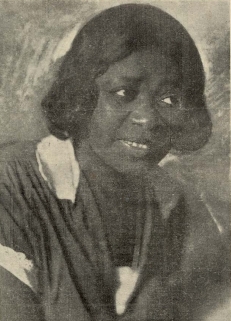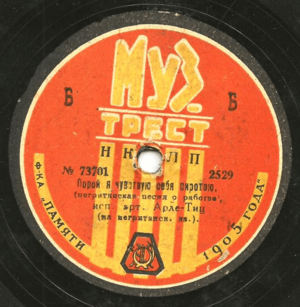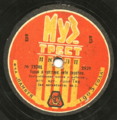Coretti Arle-Titz facts for kids
Quick facts for kids
Coretti Arle-Titz
|
|
|---|---|

Arle-Titz in 1927
|
|
| Background information | |
| Birth name | Corette Elisabeth Hardy |
| Born | December 5, 1883 Churchville, New York, U.S. |
| Died | December 14, 1951 (aged 68) Moscow, Soviet Union |
| Genres |
|
| Instruments | Vocals |
| Years active | 1902–1946 |
| Labels | Gramplasttrest Record Trust |
Coretti Arle-Titz (born December 5, 1883 – died December 14, 1951) was an amazing American singer, dancer, and actress. She was famous for her jazz, spiritual, and pop music. Coretti performed in the Russian Empire and later in the Soviet Union.
Contents
Coretti Arle-Titz: Early Life
Coretté Elisabeth Hardy was born on December 5, 1883, in Churchville, New York. Her parents were Carrie Carter and Thomas J. Hardy. Her father had moved north from Petersburg, Virginia, and her mother from Richmond, Virginia.
In 1880, her mother had a son, but sadly, the baby passed away. Later, in Churchville, Coretté was born in 1881, and her sister Anna in 1884.
Around 1886-1888, her family moved back to Manhattan. They had more children, but only Edward, Isabella Clara, and Miles survived childhood. The family lived in a busy part of Midtown.
In 1900, they moved to Hell's Kitchen, a tough neighborhood. Coretté, then 18, found work as a copyist, which meant transcribing documents. Her only musical outlet was the Mt. Olivet Baptist Church Choir.
Her Exciting Career Begins
Starting Out in Europe (1901–1907)
In April 1901, Coretté saw an ad looking for African-American women who could sing and dance for a tour in Germany. A German theater manager, Paula Kohn-Wöllner, was organizing the group. Coretté was accepted, but she was meant to be a backup.
The group, called the "Louisiana Amazon Guard," included Ollie Burgoyne, Fannie Wise, Florence Collins, Alverta Burley, S.T. Jubrey, and Emma Harris. They sailed to Germany on the S.S. Deutschland.
In May 1902, Coretté got her passport and joined the group in Europe. She changed her name to Coretté Alefred. The troupe toured successfully for five months in places like Zurich, Munich, and Leipzig.
However, in November 1902, the women had problems with their manager over money. Ollie Burgoyne became the new manager. They renamed themselves the "Five Louisianas" and continued touring Germany.
In March 1903, Ollie Burgoyne and Florence Collins left to join another show in London. The remaining members, possibly led by Emma Harris, continued touring Germany. Then, they headed to the Russian Empire.
After getting a new passport, they arrived in Saint Petersburg in July 1903. They performed at the Krestovskiy Garden Amusement Park. In September, they performed in Moscow as the "4 Ebony Belles."
By the winter of 1903, the group broke up. Coretté, Emma Harris, and Fannie Smith decided to stay in Russia and formed the "Harris Trio." They performed in Saint-Petersburg and Moscow. In March 1904, they even went to Helsinki.
In May 1904, Coretté, Emma, and Fannie joined with other performers to form the "Creole Crackerjacks Troupe." They toured major Russian cities. In January 1905, they witnessed the Bloody Sunday riots in Saint-Petersburg.
After nine months, this troupe also dissolved. Coretté, Emma, and Fannie returned to Moscow. The trio broke up in February, and Coretté and Fannie formed a new duo called "Koretty & the Creole Girl." They toured St. Petersburg, Moscow, and Warsaw for the next year.
Life as K. G. Utina (1908–1916)
In late 1907 or early 1908, Coretté married a nobleman named Utin and moved to Saint-Petersburg. His family was very wealthy and well-known. Some of his family didn't approve of their marriage because she was a performer and African-American.
After her wedding, she changed her name to Koretti Genrichovna de Utina. She also started performing again as M-lle К. Г. Утина (Mademoiselle K. G. Utina). She sang Russian Romance songs with her beautiful dramatic soprano voice. Sometimes she was called the "Indian Nightingale" or the "Beautiful Creole."
From 1908 to 1909, she performed in operettas at the New Summer Garden Theater. Her performances were less frequent between 1908 and 1910 because she had two children with her husband.
In October 1910, Coretti returned to New York after eight years. She visited her family, who were going through tough times. Her parents were not happy about her marriage.
Newspapers reported on her musical appearances as "Coretta de Outine of Saint-Petersburg." She performed in hotels, clubs, and churches. She sang beautifully at a reception in November. However, Coretti found America's prejudiced attitudes difficult to deal with, especially after being used to more freedom in Europe. She returned to Russia in December.
Back in Russia, Coretti sent her children to relatives in Moscow and started her first solo tour across the Russian Empire. She performed in Saint-Petersburg, Kiev, and Jūrmala, a seaside resort town in Latvia. Newspapers praised her performances, calling her the "Indian Nightingale" and noting her natural style.
In January 1912, Coretti was performing in Kharkov when she heard that one of her children had died. She returned to Moscow to bury her child. She resumed touring shortly after.
Studying Music and Joining the Fine Arts Society (1913–1916)
In September 1913, Coretti enrolled at the Saint Petersburg Conservatory to train her voice. It was unusual because she could barely read Russian, even after living there for ten years.
Around this time, Coretti met Boris Borisovich Titz, a 23-year-old music student. His family was also very musical. Boris was a talented pianist.
In December, Coretti was introduced to Nikolay Burenin, a pianist and director. He invited her to join his new group, the Society of Fine Arts. This society organized "literary & musical mornings" for large audiences of workers and peasants. They promoted Russian folk and classical music.
Coretti soon realized that these concerts were also used as secret meetings for revolutionaries. Some of the money from the concerts went to the Bolshevik party, a group that wanted big changes in the government. Through Burenin, Coretti met many revolutionary artists and writers. She learned about the harsh ways the government treated people who wanted change, often sending them to faraway prisons.
In 1914, Coretti performed at the Ligovsky People's House, singing a powerful song about suffering that deeply moved the workers. During World War I, she toured with the Fine Arts Society, performing in schools, hospitals, and factories. Her marriage faced difficulties, and eventually, she and her husband divorced.
From 1915 to 1917, Coretti started dating Boris Titz and possibly moved in with him. He supported himself by giving piano lessons and composing music.
In 1916, the Fine Arts Society held a concert where Maxim Gorky, a famous writer and revolutionary, gave a powerful speech. Gorky was known for speaking out against the Tsar's government. After the concert, Gorky told Coretti that he was a big fan of her Negro folk songs, saying they captured the struggles of ordinary people. Coretti met many important people at Gorky's home, including publishers, academics, and even Fyodor Chaliapin, a great singer.
Life in Ukraine and the Soviet Union
Moving to Ukraine (1917–1921)
In March 1917, the February Revolution interrupted Coretti's studies. Many African-American performers were leaving Russia because touring became difficult. Coretti learned that the American entertainment scene had changed, and many Black performers returning from Europe struggled to find work.
During the Revolution, Boris moved to Ukraine to teach music. Coretti followed him. Six months later, in September 1917, Coretti and Boris finally got married. She had been hesitant because she wanted to open a children's vocal school in America. But Boris explained the difficulties she would face in the United States as a Black woman trying to open a big business. He promised her that he loved her no matter what, and his family accepted her.
From 1917 to 1921, Coretti performed in Kharkov at various venues. She also performed at private parties and met many artists and musicians. As the Russian Civil War raged, Coretti and Boris toured with the "Concert Brigade of the South-Western Front." They performed for soldiers and workers across Ukraine.
Jazz and Soviet Success (1921–1931)
In late 1921, during a severe famine, Coretti and Boris moved to Moscow. They lived in a communal apartment, and Coretti often sang lullabies to their young neighbor, Igor Duchenne. From 1921 to 1923, Coretti continued her studies at the Tchaikovsky Conservatory's Opera Studio.
In late 1923, Coretti performed the lead role in Verdi's opera Aida. The audience felt her role, about an Egyptian captive, mirrored her own journey.
On April 3, 1924, Coretti debuted at Moscow's famous Bolshoi Theater. She sang classical pieces and Negro Spirituals. Her performance was a huge success. She hoped to become an opera singer, but critics felt she was better suited as a concert artist. After her Bolshoi performances, she toured Leningrad and other provinces.
In April 1925, Coretti and Boris performed in Tver, near Boris's childhood home. In October, Coretti signed a contract for 20 concerts with the State Philharmonic Orchestra. She toured the Northern Caucasus and Ukraine, performing works by Russian and Afro-American composers. She mentioned in letters that she enjoyed traveling but sometimes found cities stuffy.
In February 1926, Frank Withers and his Jazz Kings band arrived in Moscow and became very popular. Coretti joined them on a month-long Ukrainian tour, which helped her gain success with jazz music. She performed in Kharkov, Kiev, and Odessa. Later that year, she performed Jewish folk songs in Yiddish.
In July 1927, Coretti performed in Baku, where she was said to have introduced jazz to Azerbaijan, even though her repertoire didn't always include jazz there. She did sing in the Azeri language. On December 11, in Leningrad, Coretti performed with the 'First Concert Jazz Band.' The hall was packed, and Coretti sang in English with her beautiful, strong voice.
From 1928 to 1931, Coretti toured extensively across the Soviet Union, including Ukraine, Belarus, and Siberia. She mostly performed Russian Romances or Negro spirituals, though she sometimes included jazz. In July 1929, Coretti and Boris toured Latvia, where she performed Italian arias, German and Russian folk songs, and her Negro folk songs (spirituals, jazz, and blues). She also performed on Radio Latvia.
From June 1930 to February 1931, she toured Ukraine, Russia's Volga regions, and Siberia. In December 1930, Coretti performed in a Jazz show in Leningrad. This was her last jazz performance, as the Soviet government banned the genre two months later.
Actress and Recording Artist (1932–1938)
In early 1932, Coretti and Boris moved to a new apartment in Moscow. Coretti recorded several songs, including the spirituals "Sometimes I Feel Like a Motherless Child" and "Little David Play on Your Harp." In June, Coretti helped welcome twenty-two African-American artists, including Langston Hughes, who were invited to the Soviet Union to make a film about Black laborers in America.
In February 1933, Coretti performed in Armenia for the first time. The press praised her performance of Armenian folk songs.
On March 29, 1934, Coretti celebrated her tenth year on the Soviet stage with a radio concert that reached France and Norway. She continued to perform on Moscow's radio. In December 1934, Coretti welcomed Paul Robeson, another famous African-American singer, for his first Soviet tour.
From February to March 1935, Coretti recorded more songs and toured Ukraine and Russia. She then went to Moscow's Mosfilm Studios to appear in the film "Circus" as a maid. Her appearance was brief, but she developed a close friendship with Marian Anderson, another famous singer. In late 1935, she performed in Kazakhstan.
Most of 1936 was spent performing at Moscow's Tchaikovsky Conservatory and on Radio-Moscow. From 1937 to 1938, Coretti resumed touring, performing in many cities across the Soviet Union.
World War II and Later Years (1939–1951)
After World War II began in late 1939, Coretti started another long tour across Siberia and the Far East for over 14 months.
From October to December 1941, after the German invasion of the USSR, Coretti stopped touring and volunteered as a nurse at a military hospital in Moscow. Despite the war, she performed a successful concert of English and American music in December. For the rest of December, Boris and Coretti toured the Ivanovo Oblast.
In early 1942, they continued touring until Boris resumed teaching in Moscow. From 1943 to 1945, Coretti continued performing for soldiers at military bases and hospitals with the Soviet Philharmonic Orchestra.
In May 1945, she returned to Moscow to film Fifteen-Year-Old Captain. Coretti played a black nanny named Nan. She was treated like a star on set. On June 6, Boris and Coretti were awarded the Medal "For Valiant Labour in the Great Patriotic War 1941–1945" for their hard work during the war. The film was released on March 18, 1946, and became very popular.
By 1947, after many years of performing, Coretti's voice began to show signs of wear. She was no longer mentioned in Soviet news and lived quietly in Moscow until her death on December 14, 1951.
Coretti Arle-Titz was buried at the Novodevichy Cemetery in Moscow. Her husband, Boris Borisovich Titz, was later buried beside her after his death in 1963.
Images for kids




